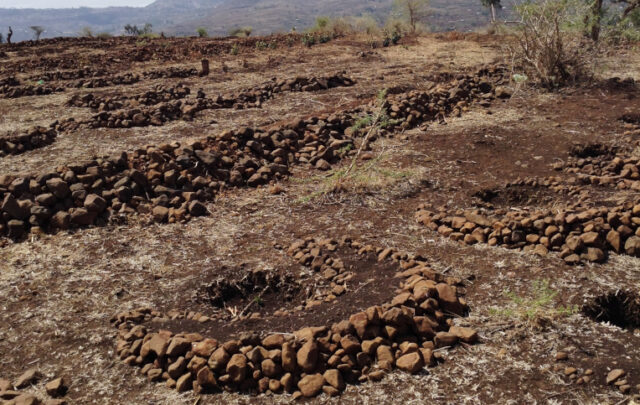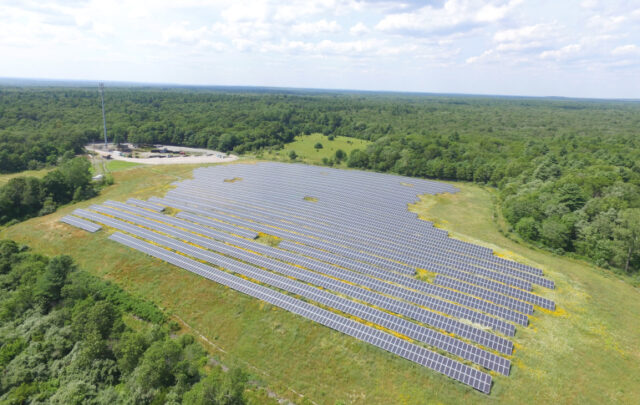I am not a big believer in coincidence—fate maybe. In Capital City, there are no coincidences. There are always dots to connect in Washington. It’s naturally part of D.C.’s charm.
This morning I’ve found three dots that need connecting.
Dot 1: Late last week rumors were circulating that Dan Coats’s days were numbered—perhaps in the single digits, Coats is Trump’s Director of National Intelligence. The source of the rumors is Chris Ruddy, CEO of conservative Newsmax TV and a close confidant of Trump. Ruddy’s rumors, unlike the other Rudy’s, have shown themselves very reliable in the past.
A former Indiana Congressman and Senator, Coats is a respected Republican who has a habit of publicly speaking truths Trump doesn’t want to hear—especially about Iran, Russia, and North Korea. If maintaining his integrity on intelligence matters were not crime enough, Coats also happens to believe that climate change poses a threat to national security:
The impacts of the long-term trends toward a warming climate, more air pollution, biodiversity loss, and water scarcity are likely to fuel economic and social discontent—and possibly upheaval—through 2018….
Extreme weather events in a warmer world have the potential for greater impacts and can compound with other drivers to raise the risk of humanitarian disasters, conflict, water and food shortages, population migration, labor shortfalls, price shocks, and power outages
The talk about town is Trump not only doesn’t like hearing much of what Coats has to say; he hasn’t been happy about what the Defense Department has to say about climate change and the future of the good ol’ USA—USA—USA. Coats was in cahoots with General Mattis and part of the now greatly diminished group of experienced advisors who knew how the game was played and was perhaps old-enough that Trump might them show them some respect—allowing them to be more honest with Old 45 than more junior staff. It was the theory anyway.
Dot 2: Today the Washington Post reported that:
The White House is working to assemble a panel to assess whether climate change poses a national security threat, according to documents obtained…
Also, thanks to the reporting of Missy Ryan and Juliet Eilperin the proposed Presidential Committee on Climate Security (PCCS), which would be established by executive order, is being spearheaded by William Happer, a National Security Council senior director. Happer, an emeritus professor of physics at Princeton University, has said that carbon emissions linked to climate change should be viewed as an asset rather than a pollutant.
Dot 3: Also, today news outlets are publishing reports about Trump’s nominee for Deputy Attorney General, Jeffrey Rosen, who is to replace Rob Rosenstein. Rosen, as the Deputy Secretary of Transportation (DOT), has played a major role in attempting to freeze vehicle fuel-efficiency (CAFE) standards at their 2020 level through 2026, which are much lower than the Obama administration had negotiated.
Talks between California and the Administration, i.e., EPA and DOT/National Highway Traffic Safety Administration (NHTSA), were halted some time ago. It’s an almost sure bet that the Administration will publish the freeze standard—as its final.
I would also anticipate that California’s waver to set more strident standards will be lifted by EPA. California is the only state allowed by the Clean Air Act (CAA) to request a waiver; however, other states may choose to follow California’s example.
The waiver has only been denied once before by the G.W. Bush administration. It was renewed weeks later when President Obama came into office. California and 16 other states[i], the District of Columbia, environmental advocacy groups and local jurisdictions petitioned the D.C. Circuit Court of Appeals in May 2018. The case is pending.
Make no mistake—these are not isolated events.
I’ll connect the dots in a second. First, a bit more background.
The White House has denied the conclusions of its own scientists since the Fourth National Climate Assessment (NCA) was deliberately released on the day after Thanksgiving in hopes that no one would notice. The Report is 100 percent in-line with the overwhelming majority of the world’s climate scientists. Relatively speaking, there are very few Dr. Happer’s around.
Acting EPA Administrator Wheeler was asked about the NCA, and he responded:
And I don’t know this for a fact —[but] I wouldn’t be surprised if the Obama administration told the report’s authors to take a look at the worst-case scenario for this report.
Trump, whose uncle gave him the gift of “a natural instinct for science,” just simply dismissed the report out of hand.
It should also be noted that the Trump administration disbanded the Advisory Committee for the Sustained National Climate Assessment which is responsible for putting out the report. The committee includes government federal, state and local government officials, academics, corporate representatives and others. The Committee’s charter expired in 2017 and was never renewed.
Wheeler and former Administrator Pruitt made it a point to fire significant numbers of sitting science advisors on multiple advisory committees throughout the Agency. The same pattern of fire-and-replace is occurring throughout the Administration. Replacements are generally of the Happer ilk, e.g., Dr. John Christy, a professor at the University of Alabama in Huntsville.
Other changes to membership on science committees have included barring anyone who has received an EPA research grant. In many cases these recipients are top university scientists whose work supports the conclusions of NCA and the UN’s International Panel on Climate Change (IPCC).
The final bit of info before I connect the dots is the recent speech of Trump’s new science advisor, Kelvin Droegemeier. According to Wikipedia Droegemeier is a meteorologist known for his research in predicting the development of extreme weather events. He previously served as Oklahoma Secretary of Science and Technology and the Vice President for Research at the University of Oklahoma.
Droegemeier’s first speech was last week before the American Association for the Advancement of Science (AAAS). Those in attendance were all pretty much of the opinion that it was a politic speech given whom he works for—he didn’t talk about anything controversial, including climate change. He politely indicated that science and technology were alive in the administration and no one in the audience booed.
If I were Trump, what would I do?
The top three things on my Donald-to-do list follow. After each action I’ve listed some specific benefits the White House might be looking to gain.
First, I would ask my Presidential Committee on Climate Security (PCCS) to advise me if climate change is enough of a problem to pose a security threat for which I would need to invoke my emergency powers.
Given the stated no-problem positions of Dr. Happer and other of the Administration’s environmental advisors, I would expect any Committee under White House protection to make a finding that there is no climate emergency—security or otherwise.
To support the non-emergency claim, the PCCS would acknowledge that the climate does seem to be changing, while indicating research on anthropogenic causes and consequences of climate change remains inconclusive.
The Committee would also indicate in its findings’ report that even though there does appear to be some negative consequences to what’s going on, the US can’t really do anything meaningful about it as long as China, India, Brazil and most of the developing world is still relying on coal and other fossil fuels.
Potential benefits to the White House of the PSSC would include:
- Countering the efforts of House Democrats and would-be presidential candidates to take the high ground on climate through various policy proposals, e.g., the Green New Deal, and House committee hearings.
- A finding of no emergency could complicate the next president’s chances of issuing a climate emergency declaration.
Second, based on the no emergency finding, I would write an executive order generally directing departments and agencies to align their reports, rulemakings, websites, etc. with the finding that the science is still unsettled. Once again indicating that anything the Federal government might do to combat climate change would put the nation at a competitive disadvantage with no appreciable improvement of the global environment.
- It is both embarrassing and emasculating for Trump to have the administration’s own agencies show him up as a lying denialist through their evidence-based reports.
- Appointment of the PSSC is being coordinated with the purging of senior advisors like Coats, Mattis, Sessions, Rosenstein.
- Together these actions would give Trump greater control of the bureaucracy.
Third, I would tweet EPA asking the Agency if the PCCS finding of no emergency is grounds to review the 2009 endangerment finding that flowed from Massachusetts v. EPA that started the agency regulating carbon emissions—particularly those from vehicle tailpipes—that led to all that Obama stuff.
- The endangerment finding is the big enchilada in all of this. As long as the finding is in existence it is going to be hard for the Administration to prevail in their efforts to roll the nation’s environmental regulations back to the pre-Nixonian period. The Administration has been cautioned by the fossil fuel industry and others against attacking the endangerment finding without some plausible excuse.
A PSSC finding might be considered plausible evidence that the earlier finding was an overreach by the current Supreme Court. Scalia’s dissenting opinion in Massachusetts v. EPA indicated that EPA’s con-tested decision not to regulate should have prevailed under the Chevron doctrine, which gives agencies the benefit of the doubt when interpreting unclear legislative language. Like so many other of the land-mark environmental cases the decision was 5-4—with Kennedy having been the swing vote.
[slide-anything id=’3472166′]
A retraction of the endangerment finding would give the administration what it needs to defend its rollbacks and would certainly help the Administration to defend its replacement of the Clean Power Plan with its Affordable Clean Energy scheme.
I recognize that all the roads out of these actions lead to a courtroom. Under ordinary circumstances, a prudent president—one loyal to the rule of law and accepting of science—would not likely want to find himself challenged in court. Trump, of course, is no ordinary president and values chaos and delay almost as much as he does himself.
Over the past 24 or so months I’ve consistently written that delays are as good as a win for climate deniers. I suspect that deep down the deniers know theirs is a losing cause. For whatever reason, they’re going to milk the fossil fuel economy for all its worth. The chaos alone benefits Trump’s re-election campaign. It’s not just the chaos alone that will motivate these kinds of acts.
The Trump administration has made it a deliberate strategy to go around trial courts and even appellate courts straight to the now conservatively-tilted High Court. The Administration has done this on every possible occasion—especially targeting environment and immigration cases. To an extent, it is working for them.
Nearly no one had ever thought that the trial judge in Juliana would have certified the government’s interlocutory motion allowing them to request a dismissal of the case before a trial could even begin. The administration had been repeatedly rebuffed by both the Ninth Circuit Court of Appeals and the Supreme Court.
I admit I’m just speculating here about what Der Donald might be up to with all the staff changes and the possible creation of the Presidential Committee on Climate Security through an executive order. It is hard for anyone not The Donald to know The Donald.
What makes the above scenario at least plausible is the one thing we can all be sure of—that our 45th president has almost always tried to prove how tough he is by exercising his executive authority—whether it is going to stand up in court or not, e.g., tariffs on solar cells and abandoning the Paris Climate Accord.
The reason? These are the only things he can do without Congressional say-so—witness the recent national emergency call. It makes him feel as big as he imagines himself to be and it seems to keep his core entertained.
*****************
[i] The jurisdictions taking part in the suit are California, Connecticut, Delaware, Illinois, Iowa, Maine, Maryland, Massachusetts, Minnesota, New Jersey, New York, Oregon, Pennsylvania, Rhode Island, Vermont, Virginia, Washington state and Washington, D.C.
Lead image: Illustration of Guy Fawkes conspirators. Wikimedia commons.
Editorial note: You can find Joel’s latest podcast here.























